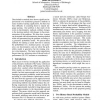Free Online Productivity Tools
i2Speak
i2Symbol
i2OCR
iTex2Img
iWeb2Print
iWeb2Shot
i2Type
iPdf2Split
iPdf2Merge
i2Bopomofo
i2Arabic
i2Style
i2Image
i2PDF
iLatex2Rtf
Sci2ools
121
click to vote
ACL
2004
2004
Discriminative Training of a Neural Network Statistical Parser
Discriminative methods have shown significant improvements over traditional generative methods in many machine learning applications, but there has been difficulty in extending them to natural language parsing. One problem is that much of the work on discriminative methods conflates changes to the learning method with changes to the parameterization of the problem. We show how a parser can be trained with a discriminative learning method while still parameterizing the problem according to a generative probability model. We present three methods for training a neural network to estimate the probabilities for a statistical parser, one generative, one discriminative, and one where the probability model is generative but the training criteria is discriminative. The latter model outperforms the previous two, achieving state-of-the-art levels of performance (90.1% F-measure on constituents).
ACL 2004 | ACL 2007 | Discriminative Learning Method | Discriminative Methods | Traditional Generative Methods |
Related Content
| Added | 30 Oct 2010 |
| Updated | 30 Oct 2010 |
| Type | Conference |
| Year | 2004 |
| Where | ACL |
| Authors | James Henderson |
Comments (0)

